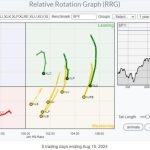Inflation Fear Hits Markets as Strong Retail Sales Fuel Growth
The recent surge in inflation fear has rattled the global markets, sparking a wave of uncertainty among investors and consumers alike. The worries stem from the rising costs of goods and services, driven by a combination of supply chain disruptions, increased demand, and economic recovery efforts post-pandemic.
The U.S. economy has seen a rapid rebound in retail sales, signaling robust consumer spending and confidence. Retail sales data for the month of June exceeded expectations, climbing 0.6% as compared to a 1.6% drop in May. This surge in retail sales has been fueled by strong demand for various goods, from electronics and appliances to clothing and sporting goods.
While the strong retail sales figures point towards a recovering economy, they have also exacerbated inflation fears. The Federal Reserve has been closely monitoring the inflation situation, with consumer prices surging at their fastest pace in 13 years. This has led to concerns about whether the Fed will need to take action to curb inflation by tightening monetary policy sooner than planned.
Investors are closely watching the Fed’s next moves, as any shift in policy could have significant implications for financial markets. The uncertainty surrounding inflation and the Fed’s response has led to increased volatility in stock markets, with investors weighing the potential impact on corporate earnings and economic growth.
In addition to inflation concerns, the recent spike in COVID-19 cases driven by the Delta variant has added another layer of uncertainty to the economic outlook. The resurgence of the virus has raised fears of renewed lockdowns and restrictions, which could dampen consumer spending and hinder economic recovery efforts.
Amidst these challenges, policymakers and central banks around the world are facing a delicate balancing act. They must carefully navigate the dual objectives of supporting economic growth while keeping inflation in check. The path forward will require close monitoring of economic data and swift policy responses to address any emerging risks.
In conclusion, the combination of inflation fear and strong retail sales has created a complex and challenging backdrop for global economies. As policymakers grapple with these dynamics, investors and consumers must maintain a cautious approach and stay informed about developments that could impact their financial well-being. Only through prudent decision-making and adaptability can individuals and institutions navigate these uncertain times successfully.



